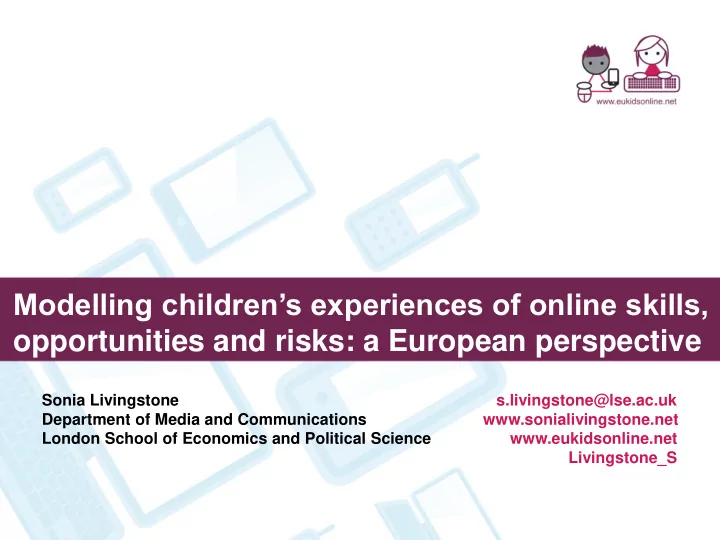

Modelling children’s experiences of online skills, opportunities and risks: a European perspective Sonia Livingstone s.livingstone@lse.ac.uk Department of Media and Communications www.sonialivingstone.net London School of Economics and Political Science www.eukidsonline.net Livingstone_S
EU Kids Online From 2006 to 2014, the EU Kids Online network grew from 21 to 33 countries (150+ researchers), funded by Safer / Better Internet for Kids http://ec.europa.eu/digital- agenda/en/creating-better-internet-kids We conducted qualitative and quantitative research to inform evidence-based policy over the key decade of internet appropriation in Europe www.eukidsonline.ne t From 2011-14, Net Children Go Mobile replicated parts of our research in 7 countries www.netchildrengomobile.eu In 2015, network coordination passed from Also in 2015, we began an LSE-based Media@LSE to the Hans Bredow Institute collaboration with UNICEF on Global Kids for Media Research, University of Hamburg Online www.globalkidsonline.net www.netchildren2020.eu
Findings • methods • recommendations
Media anxieties
Access and use is changing fast
Listening to children’s concerns
Risks
From risk to harm
Skills and literacies
Ladder of opportunities
2010 2014 31 Digital skills Change filter preferences 37 52 Block unwanted adverts or junk mail/spam 54 Compare different 50 websites to decide if 57 information is true 61 Find information on how to use the internet safely 63 Delete the record of 51 which sites you have 64 visited Change privacy settings 57 on a social networking 67 profile 66 Bookmark a website 69 Block messages from 64 someone you don’t want 71 to hear from 0 20 40 60 80 100
The more, the more
The more, the more (usually): risks and opportunities 80 DK 2014 % Experienced one or more risk factor 2010 70 RO DK 60 RO IT BE 50 IE IE UK UK 40 BE IT PT PT 30 1 2 3 4 5 Average number of daily activities
Models of (national) comparison Nation as object of study Nation as context of study Nation as unit of analysis Nation as component of transnational system (Melvin Kohn, Cross-national research in sociology 2009)
European diversity
Modelling
Children A O N c Uses, practices Opportunities Child’s Child’s identity c L --------------------- ------------------ well-being and resources I e Skills, literacies Risks (benefit, harm) s N E s INDIVIDUAL LEVEL Educators Community Digital ecology Family Peers SOCIAL LEVEL Societal inclusion Technology provision Education and Culture, media (inequality, welfare) and regulation knowledge and values COUNTRY LEVEL
Ever younger children
From observing 70 families Children use a limited range of websites, often assisted by parents/siblings Children can be relatively skilled in navigating some devices or apps but not in others Children’s skills and their limitations are often unrecognised by parents Children have little understanding of the online world; parents think this doesn’t matter We saw more diversified skills in families where parents/siblings spend time with them The relation between user and interface is crucial for children who can’t read or write
The European Commission
Working with stakeholders There is nothing a Government hates more than to be well-informed; for it makes the process of arriving at decisions much more complicated and difficult. (John Maynard Keynes, The Times , 11 March 1937)
Towards evidence-based policy
Whose agenda?
Literacy and legibility
Recommend
More recommend